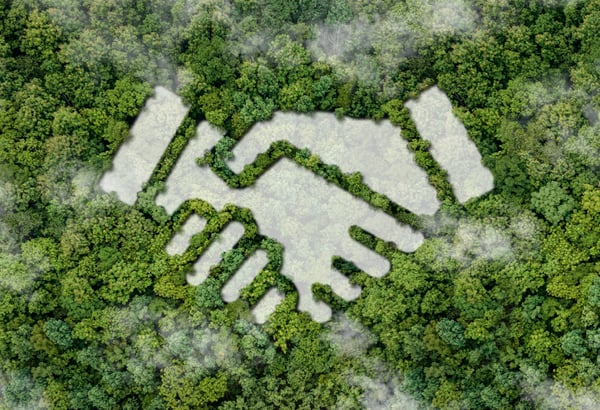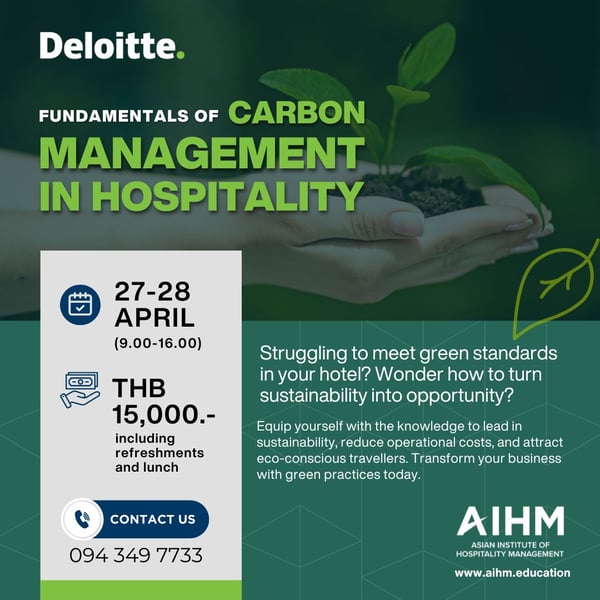Exploring the Basics of Climate Strategy: An Interview with the Expert

Climate change impacts every industry. In the hospitality industry, this is powerfully true. We host our guests in some of the world’s most beautiful environments. Amidst such amazing backdrops, it’s hard to not consider the effects the travel and hotel business play in the big picture.
At the same time, tackling climate change can feel overwhelming. It’s such a big topic. Where do you start? What should you be doing? AIHM’s Director of Global Partnerships Samantha Lauver-Marion sat down with Deloitte Thailand carbon management expert Dissayanun Pinsuwan to discuss the basics of developing, implementing and evolving a strategy to combat the threats of climate change. Read on to learn more about how climate change intersects with the hospitality industry—and the steps you can and should be taking to be a part of the solution.

Interview with Deloitte Thailand Carbon Management Expert Dissayanun Pinsuwan
SLM: Good afternoon and thank you so much for joining me today for this discussion about carbon management and the new Deloitte course that is being offered at the Asian Institute of Hospitality Management in our newly announced collaboration. Could you start off by telling us a little bit about yourself?
DP: Hi, I’m Dissayanun Pinsuwan, Assistant Manager in the Sustainability and Climate Center of Excellence at Deloitte. My team is focused on the decarbonisation of industries and how to tackle the upcoming climate-related threats to industries.
SLM: It’s great to have this opportunity to connect and to learn more about this topic. One of my first questions, one that is important to ask as a foundation to this discussion is: “What is climate change? And how can we avoid the risks associated with it?”
DP: Basically, climate change is related to the Greenhouse Effect. The Earth has a layer of greenhouse gases in its atmosphere, and that traps heat near the surface. Actually, our planet is designed to do this, but over the past decades—centuries, really—we have begun using large amounts of fossil fuels. Burning these fuels emits an excess of greenhouse gas, causing the planet to trap too much heat.
As a result of that, we can see the temperature shifting higher. We can also see more frequent occurences of natural disasters, more drought, more flooding. This is all a result of the temperature change; it’s caused by the heat that’s trapped in our planet.

The key question in the face of this climate change, this global warming issue, is: “How can we avoid or tackle this climate change?” In the past decade, we’ve begun to tackle this through international cooperation. We have the UNFCCC, the United Nations Framework Convention on Climate Change. We have the IPCC, the International Policy for Climate Change. We’ve already laid some of a foundation; we’ve developed a framework through which we can tackle climate change.
The first goal we have is that we must reduce carbon emissions abruptly in the next 10 or 20 years. In order to prevent the temperature of our planet increasing more than 2°C, we have to reduce the mass amount of carbon dioxide emissions we’re producing. In not just the hospitality sector, but in every sector, everyone should be aware of and taking steps toward reducing our carbon footprint. If we all work together and all take the care of our planet to heart, we can help reduce the overall total of carbon emissions and we can reduce the effects climate change will have on our future.
SLM: Thank you for helping us learn more about this problem and the international and intergovernmental efforts underway. Drilling down to an individual or company perspective, how can we become more hands on in overcoming this?
DP: The first thing is that, as individuals, we have be aware and understand that effects of climate change are not just at the environmental level—hurricanes, flooding, sea level increases, melting ice at the poles, things like that. As individuals, we may view these climate-related issues as very far away from us, so far that they’re not going to affect our business. You have to realise and understand that these climate risks and natural disasters can actually affect your business financially.
In our course, we will teach you how to assess the risks, to understand the status quo of your company, what is happening right now, what your baseline carbon emissions are, for example. Once you know how to translate the effect of your emissions and their result of climate threats into the financial realm, you’ll be more likely to learn more about ‘carbon management’.

The term ‘carbon management’ might sound pretty far away from hospitality. But once you see the connection between climate risks and how they effect your balance sheet, I think you’ll be more open to and also really interested in learning more about how to calcuate your impacts and how to strategise solutions.
SLM: Knowing that we can both increase our financial performance and help the Earth at the same time, this sounds like a win-win for everyone. Could you tell us a little bit more about how we can create an effective climate strategy within a currently existing business strategy?
DP: If we’re talking about business strategy, first of all it’s important to understand that the strategy is not the action plan. In a nutshell, strategy is knowing where to play and how to win. So when you’re considering your climate change strategy, the foundation of that is that you know climate change is real and it’s going to affect your company. To develop your strategy, you think about how you can tackle this. Where do you want to place yourself in this playing field to battle climate change?
This is the first thing that that we will emphasise within our class. Climate strategy is not: “Okay, I’ll do the carbon emissions reporting. I’ll calculate our carbon emissions, and that's it.” This is not the way we talk about climate strategy. Climate strategy is knowing where to play and how to win—and implementing these tactics.
Integrating climate strategy into your business strategy means you are striving to make profits but at the same time you’re also protecting the planet. How can we do that? The easiest tactic is to have a framework or KPI dedicated to counteracting climate change. Maybe you can establish a target for reducing your energy usage or reducing the carbon emissions from your own hotel. If you implement this—for example, reducing energy use—of course you pay less for your electricity bill and that generates more profit. Or if you implement a strategy for reducing waste or increasing energy efficiency, these actions have financial benefits as well.
The bottom line is that if you can increase your energy efficiency, transition to more renewable energy and reduce waste so that there’s less waste treatment offsite, these steps can reduce your carbon emissions and increase your profits at the same time. You’re decreasing the costs while taking care of these items.

SLM: When you think about examples of companies that are already doing this effectively, does anything come to mind?
DP: Most of the big names in the hotel business—Accor, Marriott and Minor, for example—have already taken some of these initial steps. All of them already know some of the key concepts related to carbon emissions. They possess an awareness of their own carbon emissions and their impacts on climate change. Big companies also have sustainability reports on their emissions as well. They have targets for Scope 1 and Scope 2 emissions. They’ve set targets—for example 2050 Goals or 2065 Goals—with timelines to achieve certain climate-related goals, and they’ve integrated directly related KPIs within their hotels as well.
Lots of the big names in the hospitality sector are already aware and already implementing climate-related strategies to a certain degree. They are evolving. They’re looking at their hospitality and travel businesses not just through the lens of making a profit. They’ve established climate action, care for the planet and sustainability as one of their key business pillars. This is a pillar they need to embrace in order to attract new clients and investors.
It's good news that big companies, big names are already aware of this and focus on on this pillar. There’s a lot more work to be done, but these initial efforts are a valuable and important start—and they build the foundation for continued efforts.
SLM: Thank you so much for having this inspiring conversation with us. I know that our readers will be able to find inspiration in what you’ve shared with us today. I hope that it encourages them to make change within their communities and within their companies.
I look forward to welcoming you and the Deloitte Thailand team to our campus for the exciting learning opportunity you have planned for us and those who register to take part in this really valuable course.
I also look forward to the next opportunity we have to connect and to continue discussing this very important subject. Thank you so much!

You Can Tackle Climate Change
Fighting climate change is a moral imperative—and it’s also an essential part of doing business today, and moving forward. Learn more about about how to protect our most valuable asset: the planet.
Register for the upcoming Deloitte-AIHM course Fundamental of Carbon Management in Hospitality.



